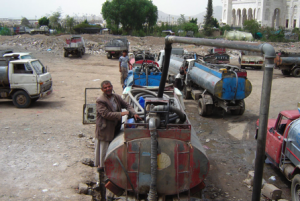The crisis in Yemen is an example of how many of the problems facing the world such as a growing population, water stress, drugs, religious conflict, unrepresentative governments, and geopolitical tension are coming together in one country. As the story unfolds I think we will get a sense of one scenario, and not a desirable one, for the future of large parts of the planet.
Population
Thanks to increasing wealth, falling infant mortality and greater life expectancy, Yemen’s population grew from 7.9 million in 1980 to 24.4 Million in 2014 and is projected to reach 34 million in 2030. While Yemen is actually bigger than Spain or California, much of the country’s interior is made up of mountains and deserts and only 2.2 % is considered arable land.
Water Stress

To get a sense of the severity of the situation, the United Nations talks about scarcity when a country has less than 1,000 cubic meters of fresh water available per person per year and Yemen reportedly had 88 cubic meter per person which essentially puts it off the charts . A Newsweek report indicates that the municipal supply of the capital city Sana only works on average once per month and thats its 2.6 million residents rely on rooftop cisterns filled by private water trucks.
The water is largely being pumped from deep aquifers at a rate which is clearly unsustainable and the same report discusses how the ancient terraces which used to trap water during the rainy season have largely fallen into disrepair.
Drugs

Much of the arable land in the country is used to produce Qat, a mild narcotic that also requires more water than other crops and according to Time Magazine, 90% of men chew the leaves and most families spend more on Qat than on food.
Sectarian Strife
The current war going on in Yemen is between the Houthi, a political movement which came out of the Zaidi tribe in the Northern part of the country and is named after Hussein Al Houthi who was killed fighting the Yemeni government in 2004. One explanation for the current round of fighting was the elimination of fuel subsidies which made it too expensive to drill for water in the Zaidi heartland.
Unrepresentative government

Since the dissolution of the Ottoman empire in 1918, Yemen has had a complex history. Initially divided into North and South neither part of the country has enjoyed much of a democratic tradition. Of the 6 presidents in the North, only one was not from the military and he was deposed in coup. Two others were assassinated in office and only the mergence of Ali Abdullah Saleh in 1978 brought order, if not democracy, to the country.
In the South the Brittish managed Aden and its surroundings until they were driven out by communist clients of the former Soviet Union. After years of war with the North, the two countries eventually merged under Saleh’s leadership in 1990 and he was the president from then until being faced with tremendous opposition as part of the Arab Spring.
Although Saleh agreed to hand power to his former deputy, Mansour Hadi, who is currently in exile in Saudi Arabia, Al Arabiya thinks he might be in the country and backing the Houthi. According to one source quoted in their article, Saleh’s team was not a government but a “gang”. This is the idea discussed a few weeks ago in a post about Mafia States that have no real connection to the people in the country.
Geopolitical tensions
The Houthi/Zaidi are Shia and much of the rest of the country is Sunni adding the spectre of Yemen being the spark that ignites a general war across the islamic world as put forward by The Independant. Shia Iran is said to arming the Houthi and an unprecedented coalition of Sunni arab nations including Egypt and Saudi Arabia have come together to fight them.
A scenario for other countries?
For anyone interested in Yemen, I also recommend looking at The Yemen Peace Project, a space for bloggers and activists who appear to be trying to save the country. I can only hope that voices like theirs can somehow manage to prevail in a very difficult situation.
The question for me is if Yemen is an example of where a number of countries appear to be headed?


i think a unrepresentative government is the main problem that Yemen is facing.